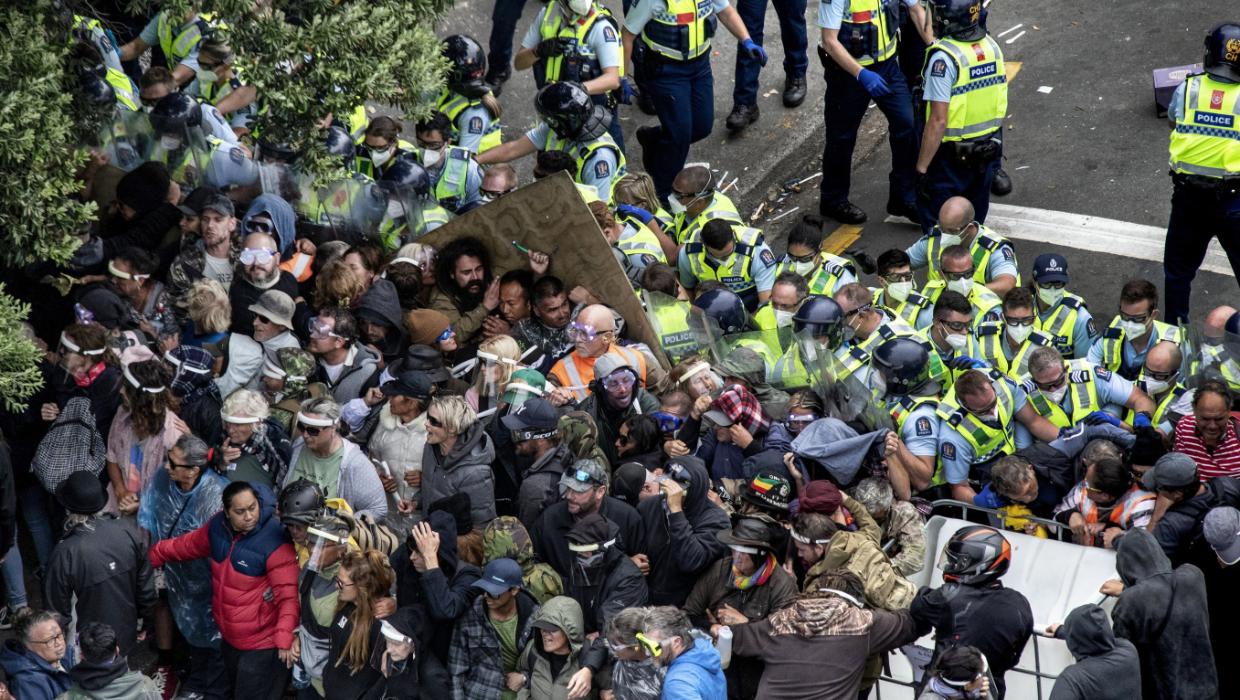Politics
Inside New Zealand’s Sovereign Citizens: Living by Their Own Rules

In New Zealand, a couple identifies as part of a growing movement known as sovereign citizens, which challenges conventional legal frameworks. Mike and Jenna, who prefer to remain anonymous, embody a lifestyle that rejects accepted civic institutions. While they appear to be an ordinary Kiwi family, their beliefs set them apart from mainstream society.
Their home, bustling with the energy of four children, reflects their everyday life. On a typical Thursday afternoon, the school bus drops off their kids, who quickly scatter, leaving a trail of shoes and bags. “We’re really quite normal,” Mike insists, suggesting they are perhaps too mundane for an article. Yet, their life philosophy diverges significantly from those around them.
Mike and Jenna adhere to the notion that laws are optional, only binding if one consents to them. They view government as a service provider rather than an authority. This belief system manifests in various ways, including unregistered vehicles and unpaid rates for over three years. Both have represented themselves in court, refusing to pay fines, illustrating a growing trend among sovereign citizens in New Zealand.
Across the country, authorities are increasingly encountering individuals who share similar beliefs. While the number of sovereign citizens remains relatively small, their actions have escalated from quirky protests to disruptive behaviors. For instance, the Raglan couple, Bradley and Michelle O’Donnell, faced a hefty fine of $20,000 for constructing an unauthorized room in their home. They claimed approval from a self-styled authority, illustrating the unconventional interpretations of legal permissions common among sovereign citizens.
In another instance, Graham Philip was charged for sabotaging a power grid during lockdowns, affecting thousands. He attempted to use references such as the Magna Carta in his defense, although these arguments were dismissed by the judiciary. More alarmingly, Richard Sivell was jailed in 2022 after threatening then-Prime Minister Jacinda Ardern, asserting sovereign immunity during his trial.
According to Stephen Young, a law professor at the University of Otago, these actions reflect a broader pattern of what he refers to as “pseudo-law.” He explains that adherents to this philosophy interpret legal concepts through a lens that often disregards established authority. “To them, the state has either lost legitimacy or was never legitimate in the first place,” Young states.
The origins of this ideology can be traced back to the United States in the 1990s when individuals began to declare themselves citizens of individual states rather than the federal government. Over time, these ideas have intertwined with various conspiracy theories, leading to the establishment of alternative courts and governance structures.
Young notes that the appeal of this movement is both practical and ideological. Individuals facing legal or financial challenges often turn to online communities that advocate the idea that compliance with laws is optional. This narrative taps into existing frustrations with authority, particularly among those feeling disenfranchised.
While Young acknowledges the valid critiques these individuals might have regarding societal issues such as corporate influence and inequality, he cautions against overlooking the broader implications of their beliefs. “If someone refuses to pay a $3,000 rates bill and it costs the council $20,000 to enforce, we as a society bear that cost,” he explains.
The ramifications of these actions in New Zealand have largely remained bureaucratic, but Young warns that complacency could lead to more severe incidents, similar to cases in Australia where sovereign beliefs culminated in violence. He cites the ongoing manhunt for Dezi Freeman in Victoria, who has been linked to the fatal shootings of two police officers.
Mike and Jenna firmly reject any characterization of their beliefs as radicalized. They see their views as a natural progression of their long-held questions about societal norms. Mike reflects on his childhood curiosity regarding authority, stating, “I never signed up for a lot of it.”
The Covid-19 pandemic significantly accelerated the growth of the sovereign citizen movement, with government interventions such as mask mandates and lockdowns providing new validation for their skepticism. Mike and Jenna opposed these mandates, viewing them as an overreach of state power.
Their beliefs resonate with others who have found community among like-minded individuals. A man interviewed during the research for this article expressed his discontent with government mandates, stating, “It wasn’t the jab; it was the way it was mandated.” This perspective underscores the sentiment that coercive measures prompted a shift toward sovereign beliefs.
Ultimately, Mike and Jenna assert that they are not seeking to harm anyone; rather, they are voicing their dissent against what they perceive as overreach. In their home, they balance work and family life, engaging in discussions about the media and societal values while sharing a light-hearted moment over a jar of Nutella.
The complex dynamics of the sovereign citizen movement in New Zealand illustrate a significant ideological divide, raising questions about authority, consent, and the implications of living outside conventional legal frameworks. The stories of Mike and Jenna, along with others in their community, reveal a broader narrative about the evolving relationship between citizens and their governments.
-

 World1 week ago
World1 week agoPrivate Funeral Held for Dean Field and His Three Children
-

 Top Stories2 weeks ago
Top Stories2 weeks agoFuneral Planned for Field Siblings After Tragic House Fire
-

 Sports3 months ago
Sports3 months agoNetball New Zealand Stands Down Dame Noeline Taurua for Series
-

 Entertainment3 months ago
Entertainment3 months agoTributes Pour In for Lachlan Rofe, Reality Star, Dead at 47
-

 Entertainment2 months ago
Entertainment2 months agoNew ‘Maverick’ Chaser Joins Beat the Chasers Season Finale
-

 Sports3 months ago
Sports3 months agoSilver Ferns Legend Laura Langman Criticizes Team’s Attitude
-

 Sports1 month ago
Sports1 month agoEli Katoa Rushed to Hospital After Sideline Incident During Match
-

 World2 weeks ago
World2 weeks agoInvestigation Underway in Tragic Sanson House Fire Involving Family
-

 Politics2 months ago
Politics2 months agoNetball NZ Calls for Respect Amid Dame Taurua’s Standoff
-

 Top Stories2 weeks ago
Top Stories2 weeks agoShock and Grief Follow Tragic Family Deaths in New Zealand
-

 Entertainment3 months ago
Entertainment3 months agoKhloe Kardashian Embraces Innovative Stem Cell Therapy in Mexico
-

 World4 months ago
World4 months agoPolice Arrest Multiple Individuals During Funeral for Zain Taikato-Fox



















